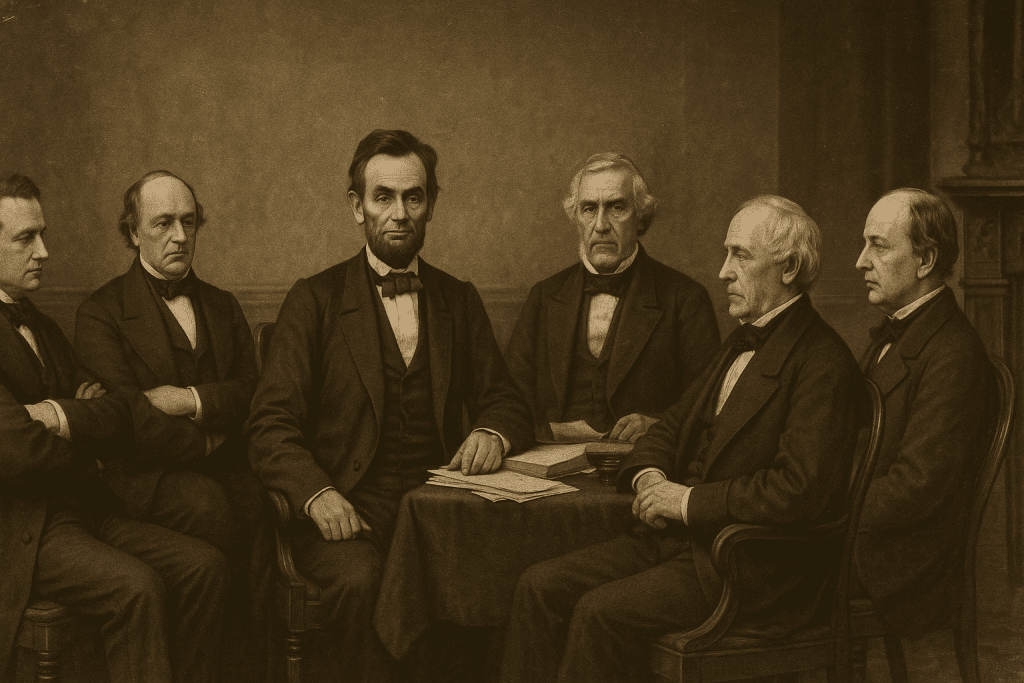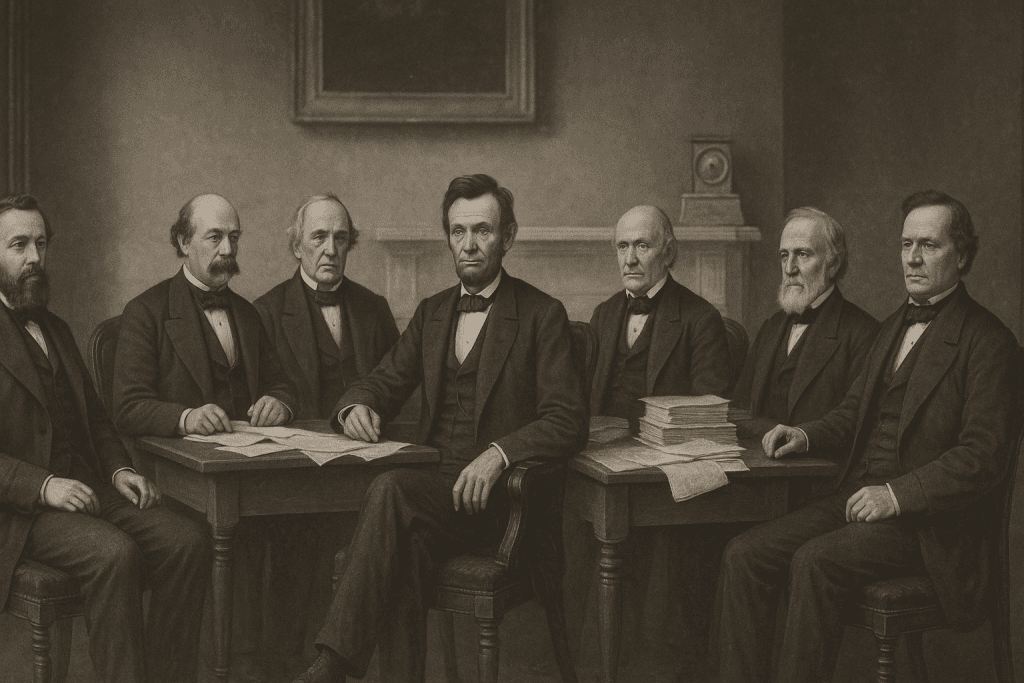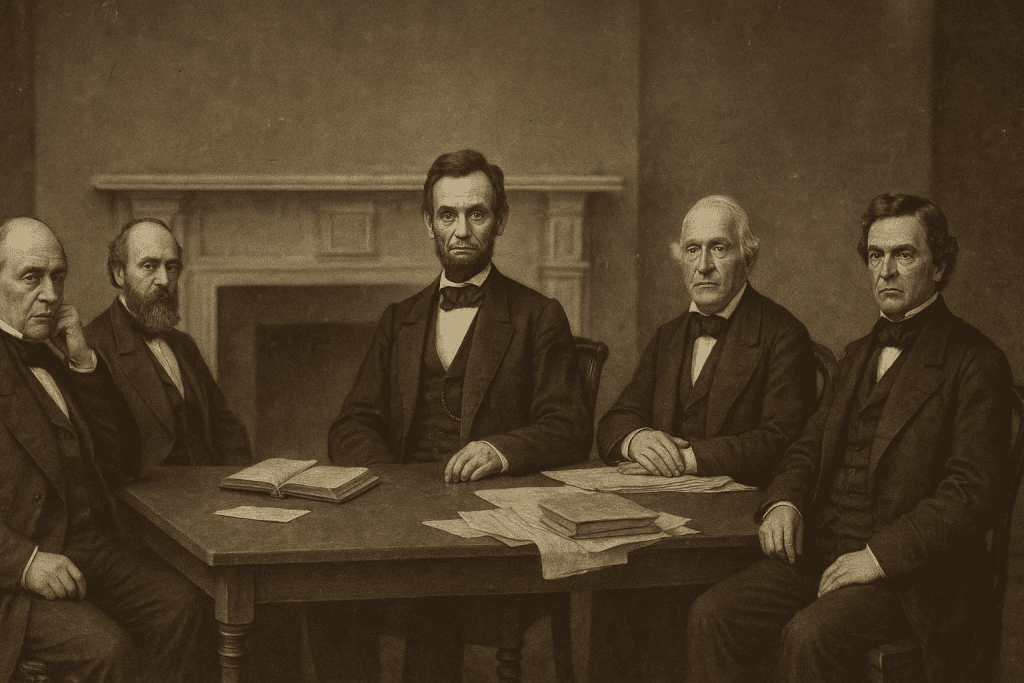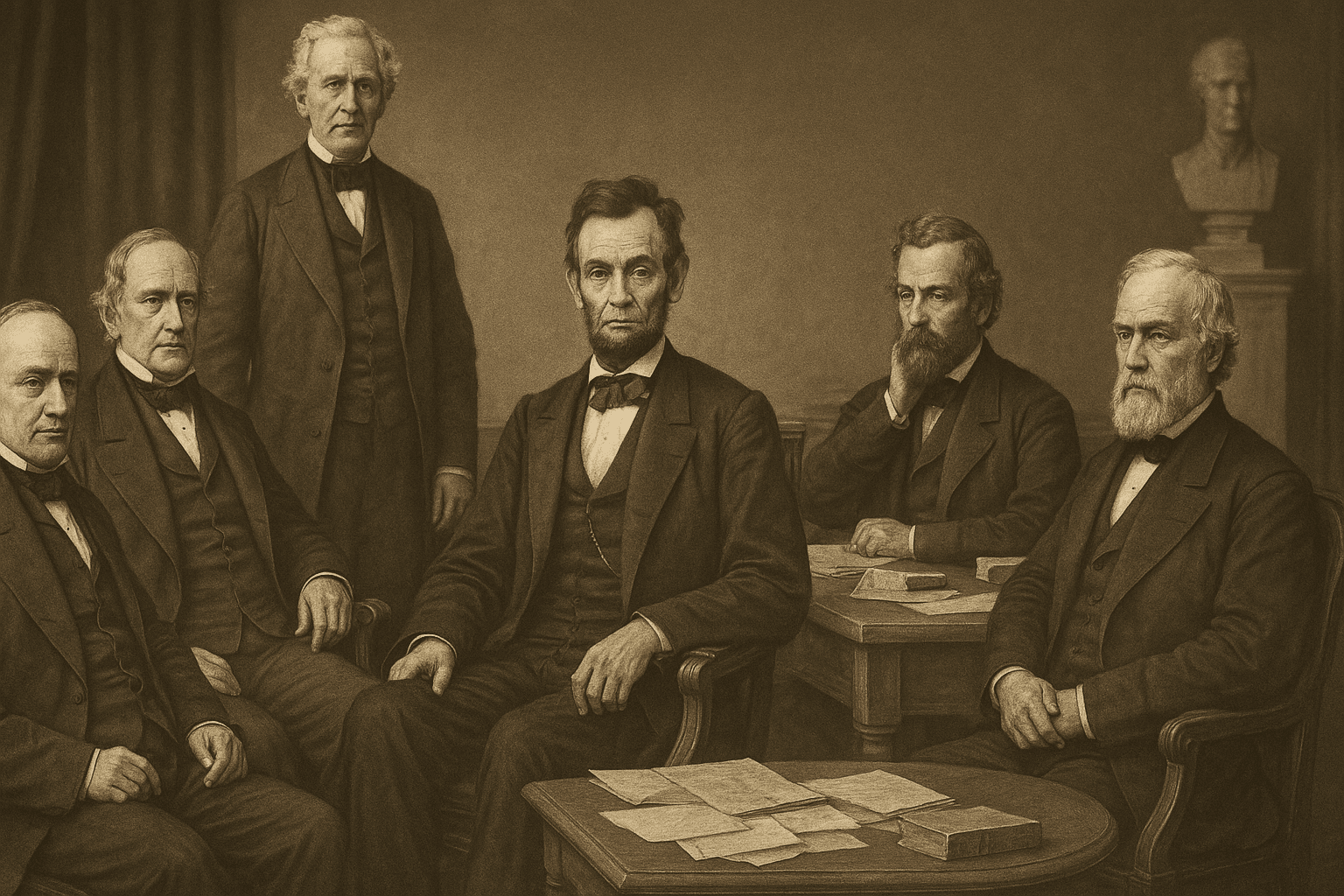Abraham Lincoln remains one of history’s most admired leaders, not only for guiding the United States through its greatest crisis—the Civil War—but also for embodying timeless leadership qualities. His ability to blend moral conviction with political pragmatism, empathy with resolve, and vision with humility makes Lincoln’s leadership style worthy of study even today.
Below are seven of the most important points that define Lincoln’s leadership, illustrated with real examples from his life and presidency.
1. Lincoln’s Leadership and Humility
One of the defining traits of Lincoln’s leadership was humility and self-awareness. He recognized both his strengths and limitations and never hesitated to surround himself with strong advisors.
A prime example was his decision to appoint a “Team of Rivals” to his cabinet. William H. Seward, Salmon P. Chase, and Edward Bates had all opposed him for the presidency, yet Lincoln valued their talents more than his pride. This humility made his administration stronger and better equipped to face the immense challenges of the Civil War.
2. Communicating with Clarity and Purpose
Lincoln’s ability to communicate simply and powerfully was central to his leadership. His speeches gave hope, clarity, and direction during turbulent times.
The Gettysburg Address, at only 270 words, is a masterpiece of clarity. In it, Lincoln’s leadership reframed the Civil War as not just a struggle for the Union, but as a moral test of democracy itself. His clarity of purpose inspired both soldiers and citizens, uniting them under shared ideals.

3. Empathy and Emotional Intelligence in Lincoln’s Leadership
Empathy was a hallmark of Lincoln’s leadership style. He deeply understood the emotional weight of decisions and often responded with compassion.
When a young soldier was sentenced to death for desertion, Lincoln personally intervened, granting a pardon. He frequently reviewed such cases, believing mercy could inspire loyalty and encourage redemption. His emotional intelligence strengthened trust in his leadership, even during difficult times.
4. Moral Conviction Balanced with Pragmatism
One of the most fascinating aspects of Lincoln’s leadership was his ability to hold firm moral convictions while balancing them with political pragmatism.
The Emancipation Proclamation illustrates this perfectly. Though Lincoln personally despised slavery, he initially emphasized saving the Union. Yet, once the Union victory at Antietam gave him the right moment, he issued the proclamation. This transformed the Civil War into a fight for human freedom while also achieving strategic goals like discouraging European support for the Confederacy.

5. Resilience in the Face of Adversity
Resilience was another cornerstone of Lincoln’s leadership. Personally and politically, Lincoln faced countless defeats and tragedies but refused to give up.
Before becoming president, he lost multiple elections and endured financial struggles. During the Civil War, he was criticized by generals, politicians, and the press. Still, he persevered, eventually finding in Ulysses S. Grant a general capable of bringing victory. This resilience allowed him to guide the nation through its darkest period with unwavering determination.
6. Inclusive Leadership and Respect for Diverse Opinions
Lincoln’s leadership was also inclusive. He welcomed debate and dissenting voices, understanding that good decisions often came from hearing multiple perspectives.
When he first drafted the Emancipation Proclamation, he shared it with his cabinet. William Seward advised waiting until after a Union victory to avoid appearing desperate. Lincoln accepted this advice and delayed until after Antietam, ensuring the proclamation carried more weight. His inclusive leadership led to wiser, more impactful decisions.

7. Visionary Leadership Focused on Unity and the Future
Perhaps the most enduring legacy of Lincoln’s leadership was his vision of a united, free nation. He always looked beyond the immediate crisis to the long-term future of the country.
In his Second Inaugural Address, delivered near the end of the Civil War, Lincoln did not gloat in victory or call for vengeance. Instead, he spoke of reconciliation: “With malice toward none; with charity for all.” His vision of unity and healing showed a leader determined to rebuild the nation with compassion and foresight.
Why Lincoln’s Leadership Still Matters Today
Lincoln’s leadership style continues to inspire leaders in business, politics, and community life. His humility, clarity, empathy, conviction, resilience, inclusivity, and vision offer timeless lessons. He showed that great leadership is not about domination but about service, courage, and keeping sight of a higher purpose.
For modern leaders, Lincoln’s leadership reminds us that challenges can be overcome when guided by integrity and compassion. His example proves that leadership is less about power and more about inspiring others to believe in a greater good.
Final Thoughts on Lincoln’s Leadership
The seven points above demonstrate why Abraham Lincoln is remembered as one of history’s greatest leaders. His style combined humanity with strategy, showing that leadership rooted in values can change the course of history. By studying Lincoln’s leadership, today’s leaders can find inspiration to guide with humility, communicate with clarity, act with empathy, and build a vision for a better future.
Read More:
Library of Congress (Primary Sources):
Gettysburg Address – Library of Congress
National Archives:
The Emancipation Proclamation – National Archives
Smithsonian Magazine:
Lincoln’s Second Inaugural Address
Questions or comments? Contact Us!
Chris "The Beast" Hall – Director of Technology | Leadership Scholar | Retired Professional Fighter | Author
Chris "The Beast" Hall is a seasoned technology executive, accomplished author, and former professional fighter whose career reflects a rare blend of intellectual rigor, leadership, and physical discipline. In 1995, he competed for the heavyweight championship of the world, capping a distinguished fighting career that led to his induction into the Martial Art Hall of Fame in 2009.
Christopher brings the same focus and tenacity to the world of technology. As Director of Technology, he leads a team of experienced technical professionals delivering high-performance, high-visibility projects. His deep expertise in database systems and infrastructure has earned him multiple industry certifications, including CLSSBB, ITIL v3, MCDBA, MCSD, and MCITP. He is also a published author on SQL Server performance and monitoring, with his book Database Environments in Crisis serving as a resource for IT professionals navigating critical system challenges.
His academic background underscores his commitment to leadership and lifelong learning. Christopher holds a bachelor’s degree in Leadership from Northern Kentucky University, a master’s degree in Leadership from Western Kentucky University, and is currently pursuing a doctorate in Leadership from the University of Kentucky.
Outside of his professional and academic pursuits, Christopher is an active competitive powerlifter and holds three state records. His diverse experiences make him a powerful advocate for resilience, performance, and results-driven leadership in every field he enters.






0 Comments